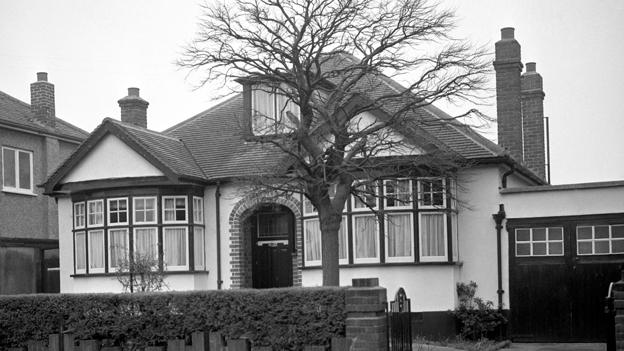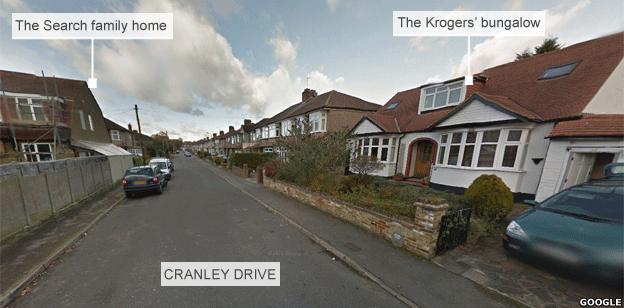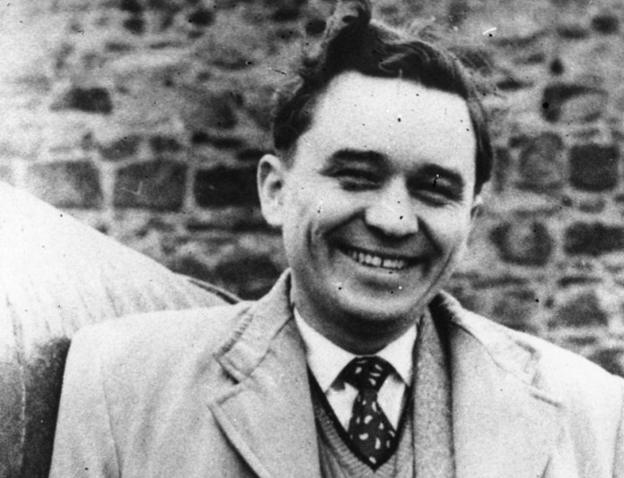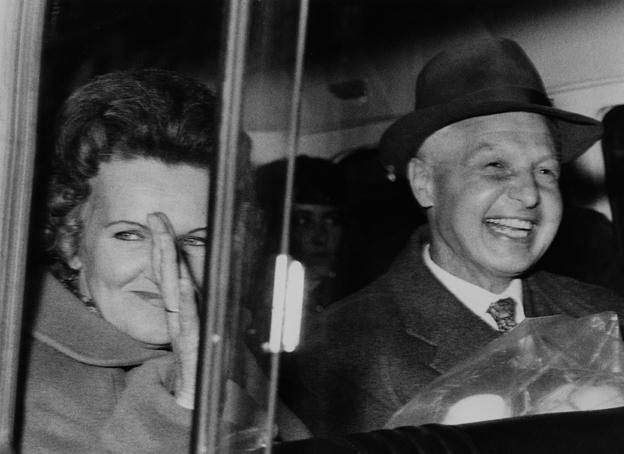The spies in a suburban bungalow
- Published

The 1961 story of the Portland spy ring reads like a Cold War thriller - Soviet agents with assumed identities, a secret radio transmitter and microdots hidden in books. But the story didn't play out in West Berlin or Washington DC, but in an unassuming bungalow in the London suburb of Ruislip.
Cranley Drive, Ruislip, is a street like hundreds of others in London's outer suburbs. It can't have changed much since, in the mid-1950s, Peter and Helen Kroger bought their home.
The house was a bungalow. But it would have seemed big enough for the middle-aged Canadian couple with no children. Initially, Peter Kroger ran an antiquarian bookshop on the Strand in the centre of London. Eventually, however, he worked from home, dispatching parcels around the world.
The house is the last one on the street before it narrows to become a small path for pedestrians. Behind stands a large garden and then a sports field. Hedges keep out prying eyes. An observer positioned on the street outside, on foot or in a car, would be obvious at once.
When the Krogers - whose real names were Morris and Lona Cohen, and who were both American citizens - moved in as a cover for their clandestine operations they must quickly have spotted the one gap in security. The house across the way partially overlooked their front door.

The danger needed neutralising. Helen Kroger clearly decided to employ her considerable social skills to strike up an intimate friendship with the family who lived there - the Searches.
Gay Search was to go on to a successful career in journalism and broadcasting. Her memories of what happened when she was 15 remain sharp.
"Helen Kroger could be an extraordinary presence for that time and that place," says Search. "She was loud and brash and everything always seemed a big drama. Even the fact she wore trousers was unusual for a woman then. I remember her whistling all the way down Cranley Drive through two fingers. When you're 15 that sort of thing seems pretty exotic.
"Ruislip was the dullest of suburbs in those days - nothing happened whatsoever. But for all that it was a good place for me and my elder brother Phil to grow up. My father worked in the aircraft industry and my mother had been a cook, but by then she was full-time at home."
She describes Peter Kroger as a quiet, bookish man, but the Search family didn't see him as much as they did Helen. "Looking back she must have come into our house almost every weekday to have a chat with my mum," says Search. "Though we never saw her at weekends."
It was only later that Search realised why the Krogers disappeared at the weekend - it was then that Gordon Lonsdale came to call.
Lonsdale was actually Konon Molody, a Russian who ran a spying operation at the Admiralty Underwater Weapons Establishment at Portland in Dorset. Secret information supplied by civil servants Harry Houghton and Ethel Gee, who worked at Portland, gave Moscow details of British advances in underwater weapons and detection systems.
Lonsdale communicated with Moscow through a radio transmitter hidden at Cranley Drive and photos of documents were reduced to microdots and sent abroad inside antiquarian books.
It was an audacious set-up.
Search recalls Helen Kroger owning a big and expensive camera, a rarity in 1950s Britain. "She was always saying, 'Oh I have a roll of film to finish so let's take a few snaps.' The funny thing is she was terrible at it - she was forever missing off your head or just photographing feet."
On 5 November 1960, the phone rang at the Searches' house. "It was Special Branch and they wanted to come and talk to mum and dad. It was made very clear we shouldn't tell anyone they'd approached us," says Search.

Gordon Lonsdale - later convicted as a Russian spy
"The men who came around showed us a picture of Gordon Lonsdale and asked if we'd seen him - which we hadn't. Then one of the MI5 guys borrowed my bike and cycled to where Lonsdale usually parked. He came back and said Lonsdale was definitely around so could they put two agents upstairs in my tiny bedroom to watch over the street?
"On the Sunday morning, one of them had come downstairs with a coffee cup when he and mum saw the front door open over the way. Gordon Lonsdale emerged from the house, threw a look over his shoulder and disappeared down the footpath. So that was the start of it.
After the first weekend the agents who came were female.
"Someone had worked out that an endless stream of men entering the house with just my mother at home might seem a bit odd. All this went on for two months, in daylight hours only. Hardly anyone had central heating then and it was winter - so the women would come and sit in the kitchen with my mum.
"On one occasion it was only as they heard the back-gate rattle that they realised Helen was almost in the house. They dashed into the downstairs bathroom but one of them left her handbag on the floor. Mum saw it just in time and said to Helen, 'Oh that daughter of mine, she never puts anything away!'"
Ruth Search was now involved in an extraordinary game of pretence with Helen Kroger.
"It's astounding that Mum was so effective. I think at first it wasn't clear to my parents that the Krogers were a big part of the investigation. Bit by bit MI5 let mum see that Peter and Helen weren't the people they claimed to be.
"It was a different time. In the Cold War people were more inclined to go along with what the authorities said. They didn't question as much.
.jpg)
Gay Search (right) with her parents in the garden of 1 Courtfield Gardens
"But in a way it also became a game of wits. Mum knew Helen had lied to her and was still lying. I think mum's attitude was well two can play at that game.
"Phil and I didn't know much at the time but we'd worked out it had to be drugs or espionage. I remember once in the kitchen Phil was fooling about doing a Russian dance, kicking his legs up. He thought it was hilarious but mum really lost it."
By the start of 1961, MI5 felt the Krogers were getting twitchy and might try to escape. On 7 January Houghton and Gee were picked up in central London and then the Krogers were arrested at home with Lonsdale.
"The next morning Phil and I were sitting revising for exams in the dining room. Jim Skardon, who ran the operation, came in and leant against the sideboard. He said, 'You'll be glad to hear you won't be seeing us after today. We arrested Mr and Mrs Kroger last night.'
"When I look back it's extraordinary that two teenagers kept a big secret for two months."

Morris and Lona Kroger, pictured after they were released from jail in 1969
Peter and Helen Kroger were given long prison sentences. But in 1969 they were released in a prisoner swap with the USSR.
As early as 1964, the film Ring of Spies had dramatised the case. Then in 1971 Hugh Whitemore wrote Act of Betrayal for BBC television, in 1983 adapting it for the stage as Pack of Lies. Judi Dench played a version of Gay's mother.

More from the Magazine

Gay Search visited Helen Kroger in prison six months before the couple were released. "It was a slightly bizarre conversation, and at the end Helen said she would never forgive my mother for what she'd done. I said, 'Oh come on what choice did she have?' Helen genuinely believed mum should have told her we'd been approached."
Gay thinks her mother never got over the strain of weeks spent lying to a neighbour she thought she knew well. Ruth Search died in 1970 at the age of 62.
Listen to Vincent Dowd's programme, Spies in Suburbia, on BBC iPlayer Radio
Subscribe to the BBC News Magazine's email newsletter to get articles sent to your inbox.